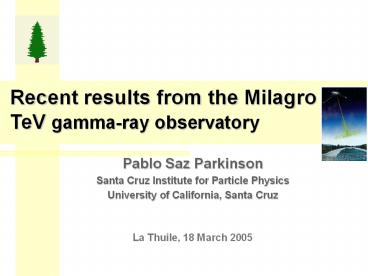Thesis Defense PowerPoint PPT Presentation
Title: Thesis Defense
1
Recent results from the Milagro TeV gamma-ray
observatory
Pablo Saz Parkinson Santa Cruz Institute for
Particle Physics University of California, Santa
Cruz
La Thuile, 18 March 2005
2
Outline
- Introduction The Milagro Gamma-ray
Observatory (astro-ph/0110513) - Recent Results
- VHE emission from the Galactic Plane
(astro-ph/0502303) - Other extended Sources (astro-ph/0503244)
- Gamma Ray Bursts (astro-ph/0503270)
- Future (astro-ph/0403096)
3
Current Milagro Collaboration List
A. Abdo7, B. Allen1, D. Berley2, E. Blaufuss2, S.
Cassanova4, D.G. Coyne3, T. DeYoung2, B.L.
Dingus4, D.E. Dorfan3, R.W. Ellsworth5, M.M.
Gonzalez6, J.A. Goodman2, E. Hays2, C.P.
Lansdell2, J.T. Linnemann7, J.E. McEnery8, A.I.
Mincer9, P. Nemethy9, D. Noyes2, J.M. Ryan10, P.
Saz Parkinson3, A. Shoup1, G. Sinnis4, A.J.
Smith2, G.W. Sullivan2, V. Vasileiou2, G.
Walker4, D.A. Williams3, G.B. Yodh1
- Department of Physics and Astronomy, University
of California, Irvine. - Department of Physics, University of Maryland.
- Santa Cruz Institute for Particle Physics,
University of California, Santa Cruz. - Group P-23, Los Alamos National Laboratory.
- Department of Physics and Astronomy, George Mason
University. - Department of Physics, University of Wisconsin.
- Department of Physics and Astronomy, Michigan
State University. - NASA Goddard Space Flight Center.
- Department of Physics, New York University.
- Department of Physics, University of New
Hampshire.
4
The Milagro TeV observatory
- 2630 m above sea level in the Jemez Mountains,
Los Alamos, New Mexico - Operational since 2000 (with outriggers since
2003) - Duty cycle greater than 90
- 2sr field of view
- Angular resolution of 0.75 degrees (0.45 with
outriggers) - Energy 100 GeV 100 TeV
- (median 2.5 TeV)
- 8 PMTs with baffles
- 2.8 x 2.8 m spacing
- Top Layer 450 PMTs, 1.5 m deep
- Bottom Layer 273 PMTs, 6.5 m deep
- Outriggers 175 black plastic tanks each with a
PMT, spread over 40,000 m2
5
Galactic Plane
EGRET All-sky survey above 100 MeV
EGRET diffuse GeV flux (in black) Milagro
exposure (in red)
6
g-rays from Galactic Plane
significance (s)
4.5 s excess for the Milagro inner galaxy
4.7 x 10-5 of CR flux First detection of the
Galactic plane at TeV energies.
7
Profile and Energy Spectrum
- Consistent with extrapolation from EGRET
- Any rapidly rising component to explain gt1 GeV
excess cannot continue to 1 TeV - Previous upper limits in this energy range well
above extrapolation - Submitted to PRL
- astro-ph/0502303
8
Milagro All Sky Survey
December 2000 to November 2003
Raw Significance (standard deviations)
Mrk 421
Crab
Astrophysical Journal 608, 680 (2004)
9
Extended source search
- Apply standard event selection
- Vary source bin size from 2.1o (optimal for point
sources) to 5.9o in steps of 0.2o - Data set June 2000 to May 2004
- 1269 days live time
- Two sources appear with high significance
- 3EG J05202556 and Cygnus Region
10
3EG J05202556?
- Preliminary
- RA 79.8o0.4o0.15o
- DEC 26.0o0.4o0.10o
- Consistent with EGRET location
- For Gaussian source profile s 0.8o0.4o
- 5.9s excess for 2.9o bin size. Probability of
excess anywhere in sky at any bin size 7 x 10-3 - Flux 0.85 x Crab
- Compatible with Whipple limit given
source extent - Accumulation of excess consistent
- with steady source
J05202556
Crab
Smoothed with 0.75o Gaussian
11
Cygnus Region
Preliminary
- 5.5s excess for 5.9o bin size (2 chance for
whole sky at any bin size) - RA 308o, Dec 42o, consistent with steady
source - Consistent with diffuse emission from region of
high density matter - Brightest GeV EGRET source in the northern sky
- Galactic plane emission still significant with
this region excluded - Flux 2 x Crab Nebula flux
significance (s)
12
Milagro GRB Search
- Evidence for TeV emission from GRB 970417a seen
by Milagrito - 37 satellite detected GRBs have been within 45
degrees of zenith at Milagro from 2000 to 2005 - Fewer than Milagrito because of BATSEs demise
- No high energy emission is detected from any of
the bursts - Analysis of the most recent bursts still
preliminary - Constraints on TeV emission are most interesting
for GRB with known redshift - 5 have measured redshift z 0.45, 0.859,1.01,
2.03, 2.04
13
GRB 010921
- First afterglow detected from HETE-localised
burst - Spectrum of the host galaxy measured by Palomar
gt z 0.45 - Closest burst to fall in Milagro field of view
- Zenith angle of 10 degrees at Milagro
- astro-ph/0503270
HETE spectrum
Milagro 99 c.l. upper limits
Stecker de Jager 1998
Primack et al. 2004
14
Search for VHE GRB emission
- Swift launched in November 2004
- It will detect 100 bursts/year
- Already 2 Swift bursts in Milagro field of view.
Analysis is ongoing. - Redshift determination should be possible for
most Swift bursts - We expect 15-20 GRBs per year in Milagro FOV
with redshift information - Larger sample by factor of 4
- Flux (even if limit) will be meaningful on each
burst
15
Summary and Future
- Milagro has been operational since 2000
- Operating with outriggers since 2003
- Crab and Mkn 421 detected
- Galactic Plane observed at VHE for first time
- Two diffuse source candidates reported
- Ongoing search for Gamma-ray burst emission for
the next two years of Swift mission - Proposing move to higher altitude (4500 m) site
with O(10) increase in sensitivity - Longer term HAWC (astro-ph/0403096)
16
EXTRA SLIDES EXTRA SLIDES
17
Bkg Rejection Compactness
Compactness
C
using just bottom layer PMTs
C gt 2.5 removes 90 of the protons and keeps 50
of the gammas
Astrophysical Journal 595, 803811 (2003)
18
Most significant locations
19
Milagro Outriggers
- 175 black plastic tanks deployed over 20,000 m2
- Each lined with Tyvek and filled with filtered
water - A single 8 PMT in each
- Operating since 2003
20
EGRET source

